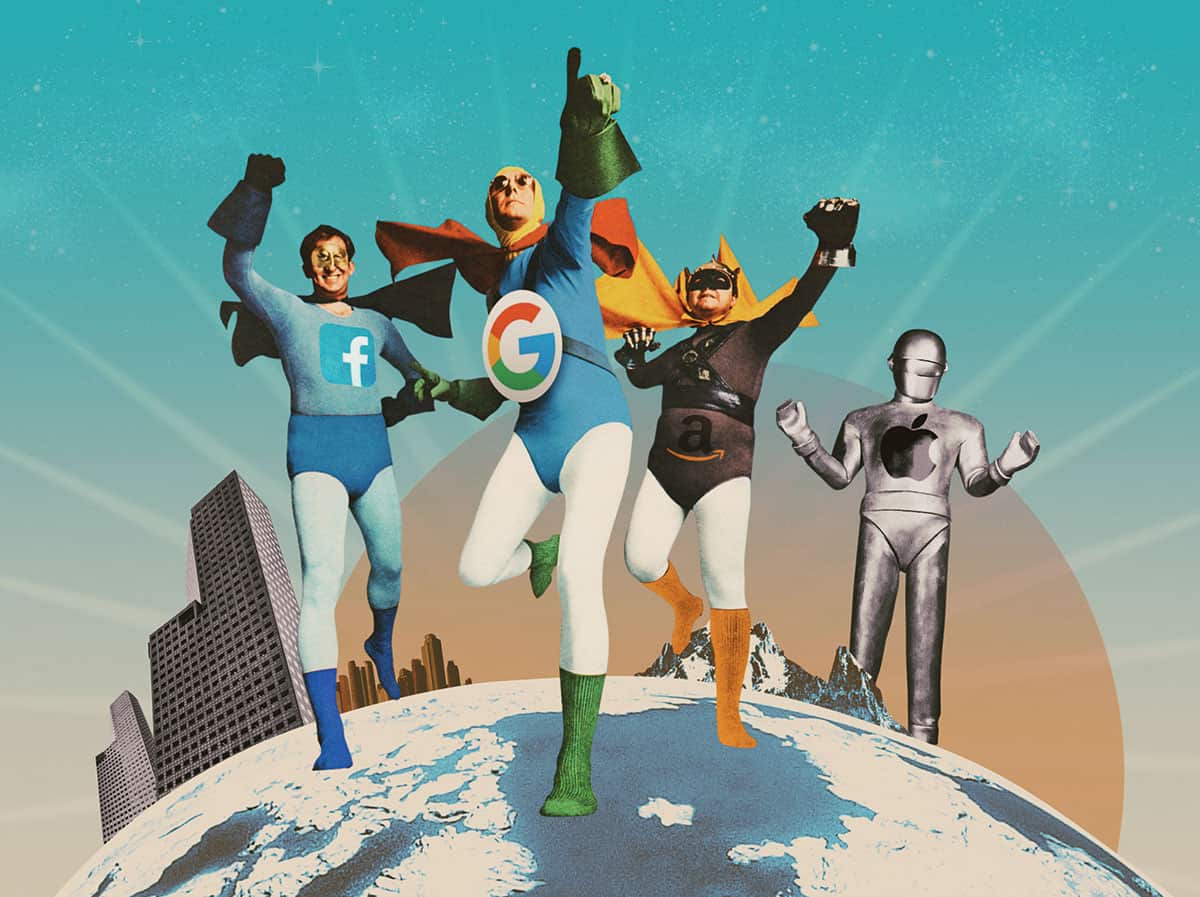10 Questions about the Geopolitics of the Web

-
- In 1989, Tim Berners-Lee and a few others created the World Wide Web based on the principles of universality, openness and free services. Has this philosophy been subverted?
Jean-Philippe Couturier, entrepreneur, founder and CEO of Whoz, speaker and panelist at HEC.
“I don’t think there was one particular ‘philosophy’ behind the web when it was created, but rather various philosophies, depending on the groups involved (university professors, entrepreneurs, etc.). The web is a general-purpose technology, as defined by the economist Richard Lipsey; in other words, a technology that breaks barriers and has the power to transform economies and societies, as well as impact daily life. The wheel, electricity, the automobile: these are among the technologies that have the potential to bring about profound transformations but whose use can also lead to disruptions, which must be controlled by regulations. This is not a new problem! In 1946, in his short story “A Logic Named Joe,” the science-fiction writer Murray Leinster imagined the excesses of a global computerized information system and its impact on people’s private lives. I’ll add that debating about the ethics and philosophy of the web shouldn’t make Europe miss the boat on artificial intelligence and blockchains; we’ve already lost out on the internet and social networks.”
- How have the major players on the web achieved such supremacy ?
Marie Dupin (H.18), attorney with law firm BDGS and author of the thesis “The GAFA and Competition Law” (Allen & Overy prize, HEC).
“There’s an amazing disconnect between the supremacy of these companies and their age. Amazon was launched in 1994, Google in 1998, and Facebook in 2004. With the exception of Apple, all of them are less than 30 years old. Their rapid growth can be explained by their capacity (now being reduced) to work around competition laws thanks to their unprecedented business models. Major players in the digital universe have created complex markets that are really hard to evaluate, particularly the two-sided market with offerings aimed at two very different but nevertheless interdependent clientele (typically, connecting platforms). The fact that their services are free makes analyzing their market strength even more problematic. And, their ability to exploit the data they collect gives them a new kind of competitive advantage. The rise of the GAFA (Google, Apple, Facebook and Amazon) conglomerates tends to lock other players out of the market. In their core businesses, they expand both horizontally and vertically through an aggressive acquisitions strategy (so-called killer acquisitions) that nips competition in the bud. They also benefit from the winner-takes-all effect: the first one to win the innovation race in a market reaps all the advantages, thus eliminating any rivals.”
- To what extent are digital companies bringing about a new social model ?

Caroline Faillet (H.00), head of Boléro, a consulting firm specializing in digital strategies.
“Digital tools have allowed citizens to acquire more and more power. Web 1.0 search engines allowed them to inform themselves about and fact-check the pronouncements of authorities (whether economic or political). This led to a desire for transparency. Web 2.0 social networks allowed them to express themselves and mobilize, sometimes calling into question established order and current laws. Web 3.0 data made possible the creation of new services (Airbnb, Uber) and new ways to act (change.org, Leetchi). Digital companies attract users through their “bottom up” approach, while the political world and traditional media remain locked into a vertical rationale. Digital players build up communities of users in which each one creates value through win-win exchanges (Uber and its drivers, Airbnb and its guests). This new model is two-sided: individuals profit from a system that offers personalized and accessible services, while at the same time finding themselves the pawns of major web players that have access to their data. Digital companies are very open about their desire to change society, but they also want to be regulated in order to be part of the existing system. In France, Uber made a powerful entry into the market, attracting millions of users, which provoked government authorities to step in and ban Uberpop for individuals but to authorize UberX, and now these private taxis can be found throughout the country. It’s the same strategy for Airbnb, which has been liable for the visitors’ tax since 2015 and has consolidated its market position.”
- Can whistleblowers like Edward Snowden help to bring about a more fair and democratic model ?
Pierre Farge (M.13), criminal-law attorney with law firm Farge Associés.
“Citizens are directly affected by Internet abuses, whether they involve tax evasion (which costs 80 billion euros per year, or 10 billion more than income taxes generate), manipulation of public opinion, or exploitation of our metadata. Edward Snowden revealed the unprecedented ways the CIA and the National Security Agency were collecting information online. His warning, condemning this violation of our private lives, brought about a new definition of national sovereignty concerning security and led to greater controls on tools for mass surveillance. In Europe, this provoked major steps forward, including the General Data Protection Regulation. Nevertheless, even though we celebrated the third anniversary of the Sapin II law on January 1 this year, protections for whistleblowers throughout the world, and particularly in France, remain inadequate, to the point that such actions by citizens are still very limited. I defend people’s actions against government institutions so that each person will have the means to combat authorities’ organized usurpation of individual rights and to counteract public-sector shortcomings, with the goal of serving the general interest, strengthening equality and supporting a wake-up call for democracy.”
- Are the GAFA benefiting from US government protection ?
Alexandre Andorra (H.15), co-author of “Geopolitics in the United States” (2016, PUF) et co-founder of pollsposition.com.
“The current US government has aligned itself with the leading US digital players against the rest of the world. Donald Trump took action against fines imposed by the European Union and then a tax proposed by France, which he saw as a customs barrier…as though the GAFA were exporting standard American products! His reaction is fairly simple and comes as no surprise: ‘If you attack me, I’ll attack you back.’ Within the US, relations are more divided. Tensions arise when a company opposes the government concerning security issues: Apple, for example, refused to unlock its iPhones when the CIA demanded this. Amazon set a minimum salary that’s twice the official US minimum wage ($15 per hour instead of $7.50 per hour). Facebook, often accused by Fox News of being pro-Democrat, will not ban political ads before the upcoming elections. Twitter, on the other hand, made the opposite decision, without attracting Trump’s ire; keep in mind that he loves to express himself in tweets (and his posts would be censored if he were an average citizen). Even though, up to now, the GAFA and the US government have been on the same side, that may not always be the case, and it will be interesting to see what happens in the future!”
- China and Russia have created their own networks and Internet tools. What are the consequences of this choice ?
Jeremy Ghez (H.05), academic director of the HEC Paris Geopolitics Center.
“The Internet was developed based on the principles of universality and interdependence. Today, however, it looks like the web might become divided into two big hermetic systems. To compete with the GAFA, China created its own digital giants: the BATX (Baidu, Alibaba, Tencent, Xiaomi). Baidu is a kind of Google, Alibaba is a cousin of Amazon, Tencent is like Facebook and Xiaomi produces smartphones like Apple’s. Huawei has recently joined them. It’s ironic that this separate system, which China chose to implement, may actually put the country at a disadvantage. With its sanctions against Huawei, the United States threatened to cut China off from the rest of the planet and leave it behind as the world globalizes. This raises the question of whether an international governing body should be created to allow these two systems to coexist. As for Russia, it’s playing a very different game: it isn’t seeking economic dominance, because it doesn’t have the means to achieve this. Rather, it’s working to destabilize the occidental model. The tactic is information warfare, and it’s working! An example is Russia’s interference in the last US presidential election. The Mueller report identified 12 Russian agents involved in hacking the Democratic party.”
- Why hasn’t Europe produced digital giants like GAFA and BATX ? What role can Europe play at this point ?

Jeremy Ghez, academic director of the HEC Paris Geopolitics Center.
The European ecosystem fostered the emergence of an aeronautics giant – Airbus – but not big Internet players. No doubt this was because the aeronautics sector was considered to involve national sovereignty, whereas the Internet, with its particular vision and philosophy, was seen as being free of government control. Europe has an important role to play, however, concerning governance. If the old saying “Americans innovate, the Chinese copy and Europeans regulate” is less and less true for the two major powers, it’s more and more true for the old continent! The European Union’s fine against Google represents a drop in the bucket compared to the annual turnover of the Internet giant, but the General Data Protection Regulation could, on the other hand, call into question leading digital players’ exploitation of users’ personal data. If they want to earn revenues from the EU market, the GAFA must conform to this regulation. It’s so complicated to put into practice, however, that they should adhere to it in all their markets to avoid making more work for themselves. In this case, the influence of EU regulation would extend beyond EU borders. The General Data Protection Regulation is just a first step toward a larger goal: to modify the business models of digital companies. Europeans are beginning to appreciate their role as regulators!”
- Why are European initiatives to regulate the digital sector taking such a long time ?
Alberto Alemanno, professor of law and public policy at HEC Paris.
Up until recently, governments have protested a lot but not done much. In 2019, the public sector studied tech companies in much greater depth. In 2020, member states are supposed to begin to try to get these companies in line. Will they succeed? The General Data Protection Regulation, which is very ambitious concerning protecting personal data, has proven incapable of changing the business models of companies that use this data, social networks especially. The GAFA tax, implemented only in France, will probably never be extended throughout the EU, since several member states are opposed to it. This failure to act stems from a lack of public-sector commitment: elected officials need social networks in order to win votes, and they need them in order to govern! Our decision-makers are now dependent on the data collected by leading tech companies. An illustration of this collusion is the UK’s former Vice Prime Minister, Nick Clegg, who was recently hired by Facebook and is negotiating a deal with the French government on the surveillance of racist and hate-speech posts. Nevertheless, the EU’s 500 million consumers give it significant leverage in imposing regulations. One example is the proposed European Digital Services Act, currently being studied, which would make social-media platforms responsible for the content of their users’ Internet posts.
- What is France’s position regarding the power of the world’s digital behemoths ?
Cédric O (H.06), state secretary in charge of digital issues.
“Major digital companies, thanks to their technological strength and their numbers of users, present an unprecedented challenge for government authorities. These enterprises have carved out central and inescapable positions in many markets, thus locking competitors out of these markets and stifling innovation. The challenges go beyond economic concerns. How can one protect one’s private life? How can governments protect their citizens from illegal online activities? These are questions that democracies must answer. The situation demands ambitious responses, which should be applied at least at the European level in order to be effective and credible. As for questions about competition in the digital economy, France promotes, along with updated rules on competition, the creation of a targeted “asymmetrical” regulation at the European level. Concretely, this regulation would aim to define “structuring” platforms and would attempt to impose a number of constraints on them, for example concerning data portability, the compatibility of certain offers, access to certain kinds of data, systematic audits of acquisitions, and responsible use of algorithms. At present, the platform-to-business (P2B) regulation is a first step toward greater transparency, but we need to go much farther.”
- Can a French digital company carve out a niche for itself in the GAFA world ?
Cédric Siré (H.97), co-founder and general director of Webedia, France’s leading online-entertainment media group.
“Yes, as long as the company is realistic. We have to accept that the GAFA won the first war, to control the power of the web. This means that it is useless to try to compete with these companies on their own ground. There are already too many players developing products and advertising offers that are less sophisticated and more expensive than those of the GAFA. There’s no chance this tactic will work! Instead, companies should aim for a strategy of complementarity. With Webedia, we created an offering based on related themes (cinema, gaming, cooking, tourism) oriented toward leading sites (Purepeople, Allociné, jeuxvideo.com, etc.). Our competitive edge is our ability to follow and target specific communities of users. For example, concerning cinema, Google has better global data but Allociné has better data on ticket sales. This is information that film distributors are particularly interested in. In every field, you have to examine where the GAFA are active in the value chain, upstream or downstream, and then occupy whatever bit of territory is left. Doing this allows a company to position itself as a partner and to acquire a place in the ecosystem. A frontal attack will never succeed. Let us turn instead to a very French technique: judo. In judo, you make use of your adversary’s strength. We need to practice judo with the GAFA!”

Published by Marianne Gérard

